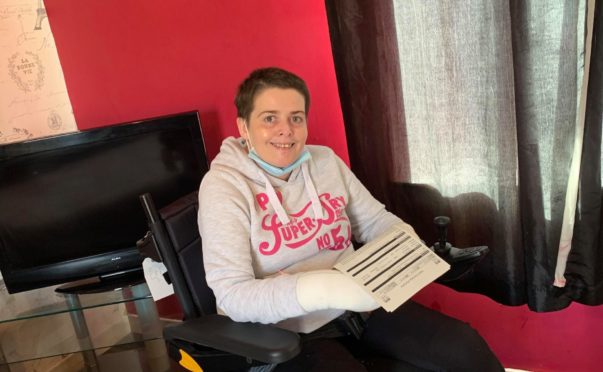A north-east mum feels “lucky to be alive” after falling ill with coronavirus while waiting for her hands to be amputated in hospital.
Joleen Ritchie, from Fraserburgh, will lose her hands when she undergoes surgery on Tuesday and her friends have already raised more than £6,000 for robotic replacements.
The mother-of-four has already had her legs amputated after developing a case of sepsis which turned them “black” at the turn of the year.
But the upcoming procedure was delayed as she was infected with Covid-19 while she lay in hospital awaiting it.
The 39-year-old yesterday explained how her six months of misery began when she took ill “out of the blue” on Boxing Day and was taken to Aberdeen Royal Infirmary (ARI) in an ambulance.
Miss Ritchie said: “I didn’t have time to be scared, it all happened so suddenly.
“I woke up about 3am and my temperature was really high, and I had trouble breathing.
“The last thing I remember was being in the ambulance with my oldest son, Paul.”
It was initially suspected Miss Ritchie had internal bleeding, however days later it was discovered her body had gone into a septic shock which was caused by pneumonia.
The mum was placed in an induced coma for three weeks and said coming out of it “felt like waking up from a dream”.
She said: “It was a lot to take in, and all of this happened out of nowhere.
“My hands and feet were black. Doctors told me there was nothing they could do for it and I’d need to have my limbs amputated.”
The 39-year-old remembers it being difficult to speak and eat in the following weeks.
She added: “My mum and my sister kept a journal, it was quite a lot I went through.
“One of the doctors said they’ve never treated someone as ill as I was.”
Miss Ritchie then had rehab at Woodend Hospital in Aberdeen, where she started making good progress until Covid-19 broke out.
“I was told I’d be safer in hospital, but that’s where I caught it”, she said.
“So I then spent another three weeks in the Covid ward at ARI.”
The Fraserburgh woman said the worst part of having the virus was the high temperatures it caused.
She said: “Every morning, like clockwork, I’d have a high temperature.
“I had a sore throat and difficulty breathing. But with the high temperatures, I felt like I was hallucinating.
“At the time, I honestly didn’t think I was going to make it.”
Feeling “slightly better” Miss Ritchie is now determined to make a full recovery.
She said: “Just eight weeks ago, I was still getting hoisted out of bed, so I have come a a long way.
“I’m not the kind of person to give up, I’ve still got a lot of my life to live.”
Miss Ritchie is back at ARI on Monday and will have her hands amputated on Tuesday.
He close friend Vicky Taylor, has set up a fundraising page to pay for a robotic hands as well as other medical aids she may need.
And, as she reflected on her ordeal, Miss Ritchie said she was left with a deep appreciation for how her family had rallied around her.
She said: “I don’t remember it as I was still in a coma at the time, but on New Year’s Eve the nurses allowed my family to stand round my bed and bring in the bells.
“I couldn’t have got through all this without my family, my kids have been incredible.
“My oldest son Paul is 21, but he never missed a visit. He always came to see me.”
Donations can be made online at ‘Weʼre raising £15,000 to help get a robotic hand for Joleen Ritchie and any other medical aids that may be needed’ on www.justgiving.com
An NHS Grampian spokeswoman said that the health board could not comment on individual cases but stressed that “enhanced” works were taking place to keep patients safe from infection.
She said: “In common with all hospitals and healthcare settings at the current time, enhanced infection prevention and control measures remain in place.
“For instance, patient placement, heightened cleaning schedules, PPE appropriate for the task and increased hand hygiene measures all contribute to break the chain of infection.”
Factfile
Sepsis is known as the “hidden killer” because it can be so hard to detect.
The condition is caused by the body’s reaction to an infection, and is related to at least 48,000 deaths in the UK every year.
It comes about when the body releases chemicals into the bloodstream to fight an infection.
Sufferers’ immune systems go into over-drive and start attacking other parts of the body too.
Ultimately it causes organ failure and even survivors can be left with long-term damage and disability.
The illness, sometimes called septicaemia or blood poisoning, can be fatal as it is often left too long before it is treated.
As happened in Miss Ritchie’s case, the condition can cause sufferers’ hands and feet to turn black as nutrients cannot reach the tissue there.
The UK Sepsis Trust has warned that survivors can be more prone to further infections, and are at an “increased risk of severe illness” if they contract coronavirus.
The NHS advises anyone who thinks they, or someone they look after, might have symptoms to call 999 or to visit their nearest accident and emergency department.
Symptoms to look out for in adults include slurred speech, extreme shivering or muscle pain, passing no urine in a day, severe breathlessness, having a high heart rate and high or low body temperature.
